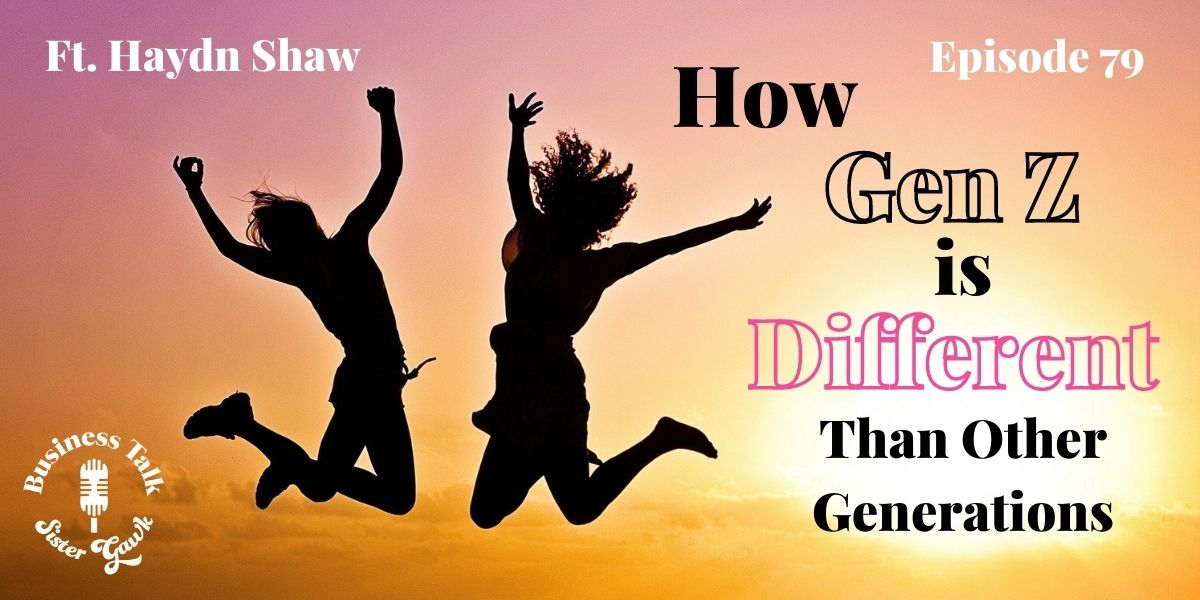This week, Generational Researcher, Haydn Shaw talks with us about the different generations we interact with in life, and how they’ve shaped business and culture. If you’re a history nerd, someone who loves learning how to improve their communication skills, or even someone that loves make connections between why things work the way they do, THIS is the episode for you. We learned so much in our conversation, and you will too. What even better? You have TWO episodes to listen to because next week, we dig more into how Gen Z is changing business with Haydn as well!
Bekkah: Today with us we have Haydn Shaw, a man who has done generational research for over 20 years, author of the book “Sticking Points: How to Get 4 Generations Working Together in the 12 Places They Come Apart”, and I’m just going to be honest with everyone and this book was recommended to me a few years ago.
I read it and it gave me so much more understanding and grace for others just being able to see how events have impacted different generations’ perspectives and how culture has changed. It was eye-opening and it’s been on my bucket list for a really long time to see if we could get Haydn Shaw on our podcast so we’re really excited about this! Thank you so much for being with us today!
Haydn: Well, I’m so excited to hear your story! I’m glad that you found it helpful and I like the word you use that if we understand other people it just gives us more grace for them!
Ruthie: Yeah, and so we’re gonna do two episodes with Mr. Shaw and the first episode here Bekkah already mentioned and we’re gonna get into our first question.
What Are Defining Characteristics of Each Generation?
Bekkah: Yeah, so could you describe for us a summary of each generation?
Haydn: Yeah, real quick. I’ve now updated the book so there’s a second edition out that includes Gen Z in it!
Bekkah: Oh!
Who Are Traditionalists?
Haydn: And so if you look at all five of them – traditionalists they’re the people who are now over 75 and a great group of folks. Tend to be more conservative politically, tend to be more conservative economically, and yet all generations are more liberal than they were 25 years ago but more conservative than the other generations. Influenced many of the people who grew up in the Great Depression.
Who Are Baby Boomers?
They’ve passed on but influenced by family members who have lived with that, lived with the stories of all of that. Then you’ve got Baby Boomers who are great, great folks but they’re getting older now. Many of them are retiring and COVID was an opportunity for many of them to say, “Okay, I guess I’m never going to wear pants again.” And some of them are staying at home and others of them are like, “Alright, let’s just call this retired,” and so they’re in that age range.
Who Are Gen Xers?
Then you’ve got the Gen Xers and you know Baby Boomers were very much called the “Me Generation” you know Time Magazine heralded them as that. They went from the Survival Mindset to the Significance Mindset in contrast to the Traditionalists who grew up in a much more challenging time and just surviving was the key goal. Many of the basic frameworks and morals shifted with the Baby Boomers. They’re very focused on psychology, very focused on self-actualization, and are actually 5% less happy than the other generations.
Bekkah: Interesting!
Haydn: Yeah, statistically speaking. Gen X, on the other hand, are the folks that tend to be managers. Boomers are managers and executives and organizations now. In family businesses, it’s not all uncommon to have a Boomer still in the business as well as an Xer who may be managing things.
Who Are Millennials?
Now the Millennials are older. The Millennials are 40. Isn’t that crazy? People still refer to them like they’re, “All these Millennials drive me crazy! Get off my yard!” And you know Millennials are protected by age discrimination laws now.
Bekkah: Really?
How Are Each Generation Is Related to Others
Haydn: Yeah so 40 is when age discrimination laws kick in and so we just don’t think of them that way. We don’t think of them as people who are protected by age discrimination laws, the older end at least! So you’ve got Xers that grew up a little more cynical. Bart Simpson was their longest, you know, The Simpsons was the longest-running show for that generation.
A little edgier than Leave It to Beaver for the Boomers, a little! Just slightly edgier! The Simpsons probably more than almost any other show especially any of the long-running show was willing to deal with anything – religion to politics to anything The Simpsons would handle it. Whether you like their approach or not. More cynical, they call it more realistic.
They had to move organizations to get ahead typically and where the Boomers tended to stay in place and the Xers were the first generation to be native to technology. It may have been a k-pro and you know it may have been a laptop larger than your coffee table, but they were the first generation that were native to technology.
Millennials, of course, the first generation native to the smartphone and the miniaturization of information. Now Millennials they were much more hopeful. Xers were more cynical. They grew up with the great recession and they grew up with the world getting smaller and far more global competition.
Whereas the you know the Millennials they were raised by those Boomers, by Traditionalists, and Boomer parents and they were just raised to be optimistic. “You can be anything you want to be!” Bob the Builder, “Can we build it? Yes, we can!” Yeah and Gen Z they’re only –
Ruthie: The Millennial mascot.
Haydn: They were the Millennial mascot! That’s right! There was quite a – and even the internet was brand new and sparkly! Post anything anywhere! Isn’t a smartphone amazing? Well, Gen Z had such a different growing up with the younger Boomers and then the Xers who raised who were raising them. Second half the – I’m sorry. Second half of the Xers and the beginning of the Millennials. First half the Millennials are raising Gen Z and they’re like, “No, no, no, no! Don’t post anything or you’ll never get into school!” First thing they do for college admissions is to go search your social media and you know, let alone you can’t be president or if people take too many pictures of you. In Canada, you can’t be a Premier and as a result, it just creates a challenge.
Haydn: Gen Z is much more – what’s interesting is they’re much more savvy with technology than any of us were at their age! They have six different profiles that they juggle. Whereas you know the rest of us were like, “How do you do Facebook?” and I have to admit I didn’t mess with Facebook until I had kids go off to college and that was the only way to keep up with them. Now with grandkids I check it like five times a day just like one of those test subjects rats that just kept hitting the pellet bar hoping something would fall out. It’s like a logical test just in case there’s a grand, grand baby. With even Generation Z they’re in that unnamed generation. That seventh generation we haven’t – our sixth generation we haven’t named yet.
Bekkah: Okay.
Haydn: How’s that for an overview? Any other details you want?
Bekkah: I think that was great!
How Are Generations Shaped by History and Events?
Ruthie: Yeah, perfect! The next question we had was how are generations shaped by history in the events around them?
Haydn: Well, take – you know take the t-shirt I’m wearing! I love to wear an “Okay, Boomer” t-shirt “Have a terrible day.” I love to wear that because you get all these Millennials or Gen Z’s who stare at you when you’re out at a restaurant or something. They’re like, “Do you know what that means?” Oh I do! That’s why I’m wearing it!
Ruthie: He doesn’t just have one! He has two “Okay Boomer” shirts.
Haydn: Well, I’ve got one in each color! Yeah I actually have a speech presentation on Gen Z where I explained Gen Z using nothing but t-shirts. I had to get all my kiddos to wear them. Kiddos and girlfriends to put them on and take pictures in them so that they were copyright legit but I – yeah! You can kind of tell how Gen Z sees the world and the t-shirts they made. Especially, the ones they made to mock Baby Boomers. It was funny because you know while Millennials got a lot of the heat for the “Okay Boomer” t-shirt it was actually Gen Z entering the larger world of voting, the world of work, graduating from college, and coming out with guns and blazing!
Who Generation Z Is
Haydn: So some of the things that that made Gen Z far more liberal socially. Some people are like, “Oh, well, they’re like the Millennials!” Well, yeah Millennials and Gen Z are both very liberal socially and interested in Socialism. They don’t usually mean the same thing as the older generations do. You know they think of the Soviet Union as Socialism, Communism. Whereas younger generations tend to think of it as Denmark and who wouldn’t want Denmark. Whereas so there’s just a big generational disconnect. Just a post yesterday regarding socialists and progressives and often the media uses the word progressive to capture those people who would very much favor a more socialistic form of government. You think about what what shaped a generation who just baffles their aunts and uncles that they could think that way. Just baffles them. “You know they’re socialists!”
Haydn: Well, first of all it’s a big misunderstanding. What you mean and they mean by the word and secondly they’re like, “I’m going to have $37,000 of debt for my college and that’s if I don’t go to grad school! And on top of that I’m not going to be able to get a house until I’m 200.” Yeah that’s just a slight joke but only slight with the way the housing market’s gone crazy and left people behind. So you know they those things shape them! The fact that the cell phone was everywhere shaped them. Who they contact and how they interact their parents are much more reluctant to let them go out and play. St my age, 58, I was told to get outside. Don’t come back in for a couple hours! Somebody admitted to me late last week that their mother would lock the door. We would come home from school and our parents would lock us out. It was safe they’re like, “Go play!” All of that’s great stuff in order to move forward in understanding that you know generations aren’t strange. They’re just shaped by different things that are strange to you.
Bekkah: As you’ve been researching this for so long what sticks out to you most about the changes that are occurring within Gen Z compared to previous generations?
Haydn: Hey, Bekkah I’m just a little offended that you put such emphasis on the word “So.” “SO Long!” *all laugh*
Ruthie: I thought about that too!
Bekkah: I’m sorry!
Haydn: You know it’s not that it’s not true, but just thank you for rubbing it in!
Bakkah: Oh, no! I was more just saying like you have a lot of experience. That’s what I was trying to get at.
Haydn: I’m just kidding! I’m just giving you slack! I’m just talking smack. I thought that was funny. So say the question again. “In SOO much of my research-” what was your question?
Bekkah: Okay I will re-ask it. As you’ve been researching all of these different generations, what sticks out to you most about the changes that are occurring with Gen Z compared to previous generations?
One Characteristic That’s Unique to Generation Z
Haydn: Well, I think that’s a great question because people have been saying, “Oh, Gen Z. They’re the Millennials but on steroids,” or, “No, if you think you understand Gen Z because they’re like the Millennials you’re wrong.” So there’s all these contradictory messages about Gen Z and the fact is some things are a lot like the Millennials. Like they’re political focus and then other things are not like the Millennials at all! The Millennials came in much more optimistic Gen Z is much more buckled down.
Bekkah: Hmm!
Haydn: Yeah, Millennials were like, “Can we build it? Yes, we can!” Gen Z was like, “Yeah, no, I just got to find my way at work and build a career.” And you know Gen Z is like, “I don’t plan to get married until I’m after 30, because that’s how much time I have to put to advance my career and it really wouldn’t be fair to a relationship to do that.”
Bekkah: Interesting, that’s a long time!
How Marriage Is Changing For Generation Z
Haydn: Well, it is a long time. Well, it was a long time! The average age of marriage especially after Rona is 30 for men and 28 for women. It just keeps going up. So that’s one of the big shifts with Generation Z is kind of the cutting edge of generational research is life stages. Millennials as well, but Millennials and Gen Z are both shaped by much longer time to get education and longer time to be taken as a full-fledged adult. People over 30 see adulthood at the beginning at 28 people under 30 see adulthood as beginning at 28. It’s one of the few things everybody agrees with statistically.
Ruthie: Wow! So 28 magic number!
Haydn: Yeah, 27, 28 and it’s all around the world! All around the world people agree with that. That there’s this new life stage between adolescence and full adulthood. My daughter’s 25 you know she’ll graduate in a couple of months as a physician’s – they just recently voted to change the name for a physician’s assistant, but anyway she’s graduating. She’s like, “I don’t think of myself as an adult.” She thinks of herself as in between time. You know that makes sense. She’s not finished, long education but also a lot more freedom! Matter of fact I did a TED talk on it! In case your listeners are interested! I did a TED talk called “Why Half of What You Hear about Millennials Is Wrong” and it’s about why half of what shapes their behavior is their life stage and especially this new life stage of emerging adulthood and not even their generation. They’re not disloyal because they’re Millennials they bounce around organizations in their 20s because they’re emerging adults.
Bekkah: Yeah, so I have a question –
Haydn: That’ll be the case with Gen Z as well because that’s a life stage change and not a generational change.
People Who Don’t Feel They Can Identify With Any Generation
Bekkah: I have a question for you then. Do you find it common for people to become upset like when you’re talking about generational differences because they feel like they don’t identify with one over another?
Haydn: Occasionally! Some of us are cuspers, but I’ve noticed a disproportionate number of people who research and speak about, write about the generations who are cuspers between two. I have some characteristics of Boomers and some characteristics of Gen X and so I think often people who are on the cusp find themselves struggling to identify with the generation. My daughter would be a customer at 25. She would have characteristics of Gen Z and more characteristics of Millennials. So you know she would be a cusper, though. There’s usually a four to five year gap between where the generations overlap and it’s hard to tell exactly where one ends and another begins.
How Does Communication Style Differ Between Generations?
Ruthie: Okay, so when you think about like the differences between the generations how do you see communication style differing between generations?
Haydn: The older generations are – I always joke. I was up in your fine state in Minneapolis talking to a whole group of people who are family farmers one Saturday and I said, “Hey, if you want to make yourself a thousand dollars, in 10 minutes just shut off your phone put it flat, slide it in the middle of the table, and say, ‘Well, hey, grandma, what’s going on?’ And they will go change your will! They will change their will and cut your parents out and give money to you! You’ll make a thousand bucks a minute because they will shift the money over because they’re like, ‘Oh, they can make eye contact! What a wonderful child! I knew they turned out okay!’” Because can you make eye contact? Whereas for Baby Boomers they grew up and if you remember the movie “It’s a Wonderful Life” that’s how George and Mary fell in love! They fell in the water, they walked home, they sang, they talked, they wrote letters, it was how people fall in love is how they prefer to communicate! Baby Boomers they were all about the phone! All about the phone! Calling home and the old man on the one phone was sitting in the chair by the phone and you had to take your life in your hands, “Is Lori there?” “Who’s this!” “I don’t know! I think I wet myself!”
Ruthie: “You know what? Nevermind.”
Haydn: You took your life in your hands with the old man! You know, Gen X they got all those little discs in the mail. You know they were dialing up and going to chat rooms and all kinds of people didn’t have Dad screening quite frankly. I’ve had people say to me, “I know! I dated some losers because the old man wasn’t there to screen them!” Because they were on dial up and chat rooms. *makes static noise*
The Best Way to Start Understanding Generation Z
Bekkah: What is the best way to start understanding Gen Z better would you say?
Haydn: I think the best way to understand Gen Z better is to look at kind of an overview characteristic. So when I updated the Sticking Points book I added some things that I call “Ghost Stories”, because to your point about history they’re the stories that explain whether you can back them up with – a historian would go, “Yeah, that’s legit!” They’re the stories that make sense of people and I think when I wrote the book would be historically legit but in our relationships we tell stories. Half the time my wife goes, “That’s not quite how it happened.” But the stories even if they’re not historically all nailed down they explain why we think certain things or why we react certain ways. One of the best ways to understand Gen Z is to understand just some characteristics the research picks up. The first one is they are much more focused on mental illness. If LGBTQ+ was the way the Millennials came out of the closet, mental health and emotional health would be how Gen Z comes out of the closet. I start the chapter off with my daughter singing every word to Evan Hansen. I’m like, “This sounds like a musical about mental health!” She goes, “I know!” Alright so mental health, suicide, online personas. I mean Evan Hansen and sold more soundtracks the week it came out than any other musical including Hamilton! Any other musical since 1969 in the Man of La Mancha!
Ruthie: Wow! That’s crazy!
Haydn: So just like Wicked kind of captured if there was a musical for the Millennials, I’d say Wicked captured the Millennials and Rent even calls itself on its website “The musical for Gen X.” Evan Hansen was clearly the musical for Gen Z with the struggles and challenges that people face with all that technology and with managing your personas online.
Generation Z Cares About Mental Illness and Neurological Diversity
Haydn: With mental illness with drugs and then just with neurological diversity it is now kind of the phrase that’s being used even instead of mental or emotional illness. But people talk very openly about that and older generations may go, “Oh, those snowflakes!” Well, the Snowflakes are coming in saying, “Hey, I’ve got doctor’s orders here now how are you going to accommodate this?” And talking about communication, “I don’t know why you’re yelling. You’re triggering me.” and while older generations make fun of that *all laugh*
Bekkah: I get you right now, go ahead, yup.
Haydn: While older generations make fun of that you know 50% of people told in UCLA’s freshman survey 50% said they plan to use counseling services at the university they went to.
Ruthie: Hmm! Wow!
Haydn: Well, this is one of the reasons Time Magazine had a cover story three or four years ago now of how counseling centers and universities were quadrupling their staff just to handle intake. They don’t want – of course they don’t want the moral liability of not being able to get to someone who you know who harms themselves.
Or even the financial liability of a family saying, “Well, my child came to you and you couldn’t see them and they committed suicide!” and so much more open when 50% of people said, “Yes, I’ll consider!” I mean 50% of people aren’t even gluten-free! *all laugh*
Ruthie: That’s fair! Seems like those are multiplying, too!
Haydn: Well, that’s right! That’s right and that was a pretty hot thing on college campuses for a while, “Oh, I’m gluten-free!” Yeah really! I have been for 25 years and, no, you don’t want to be if you don’t have to be. Nothing tastes like a hamburger in a real hamburger bun that doesn’t fall apart into 47 pieces when you bite into it. I’m just saying it’s a very bitter man who has to go gluten-free!
Ruthie: My brother has a saying there he’ll ask me if I’m like upset about something he goes, “On a scale of one to nature valley granola bars how badly is your life falling apart?” So maybe you should that could be yours but for gluten-free hamburger buns. We have so enjoyed getting to chat with you, Mr. Shaw.
We just thank you so much for joining us today we’re gonna have part two next week so make sure to tune in for that before we kind of wrap up and go into our sister gawk portion. Haydn, could you tell us where to find you?
Haydn: Yeah, you can find me at peopledrivenresults.com. How’s that for a long website name so www.peopledrivenresults.com and you can also see me from time to time on LinkedIn.
If you enjoyed this episode, you should share it with a friend on Spotify, it’s episode 79!




